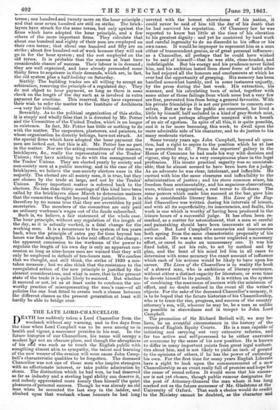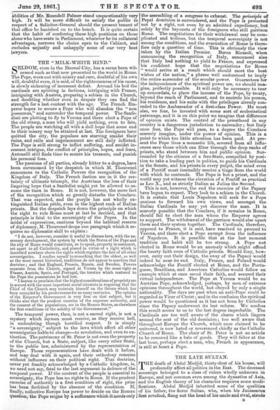THE LATE LORD-CHANCELLOR. D EATH has suddenly taken a Lord Chancellor
from the woolsack without any warning, and in five days from the time when Lord Campbell was to be seen among us in health and vigour, a successor presides in his seat. In the future histories of our Chancellors, his name will occupy a modest bst not an obscure place, and though the abruptness of his efd was such as to touch the English public with something almost akin to sympathy, the talent and learning of the new wearer of the ermine will soon cause John Camp- bell's characteristic qualities to be forgotten. The deceased Chancellor was not one of those men who inspire strangers with an affectionate interest, or take public admiration by storm. The distinction which he had won, he had deserved as far as industry and a sterling legal ability can deserve it, and nobody appreciated more keenly than himself the quiet pleasures of personal success. Though he was already an old man when he mounted the last step in the ladder, and climbed upon that woolsack whose honours he had long coveted with the honest shrewdness of his nation, it could never be said of him till the day of his death that he had survived his reputation. Of Chancery law he was reported to know but little at the time of his elevation to his greatest dignity: and yet he contrived by hard work and careful ingenuity to do no discredit to his office or his own name. It would be improper to represent him as a man either of transcendent genius, or of great personal influence ; as a Chancellor, all perhaps that he could have wished to be said of himself—that he was able, clear-headed, and indefatigable. ' But his energy and his prudence never failed him, and his ambition lasted from sheer force of habit after he had enjoyed all the honours and emoluments at which he ever had the opportunity of grasping. His memory has been handled somewhat harshly, and in some instances unjustly, by the press during the last week. His extraction, his manner, and his calculating turn of mind, together with some other of those failings from which none but a very few are free, prevented him from being a general favourite. With his private friendships it is not our province to concern our- selves. But as far as the public are concerned, he lived a little by himself, half secluded in a kind of grey Scotch mist, which was not perhaps altogether unmixed with a breath of an air of egotism. In spite of all this, it is quite possible, and it is far more becoming, this week, to dwell upon the more admirable side of his character, and to do justice to his many moderate virtues. Some twenty years ago John Campbell, beyond all ques- tion, had a right to aspire to the position which he at last was permitted to fill. From the reporters' gallery in the House of Commons he had made his way with decision and vigour, step by step, to a very conspicuous place in the legal profession. His innate practical sagacity was so unmistak- able, that he almost seemed to have been born for a judge. As an advocate he was clear, intolerant, and inflexible. He carried with him the same clearness and inflexibility to the administration of justice ; and his stern common sense, his freedom from sentimentality, and his sagacious observations, were, without exaggeration, a real terror to ill-doers. The same powers which made him succeed at the bar, gave him also a considerable literary fame. His Lives of the Eng- lish Chancellors was written during his intervals of leisure, and with all its superficiality, its inaccuracies, and faults, the work is one which is worthy of having been produced in the leisure hours of a successful judge. It has often been re- marked, as a matter for astonishment, that a man so careful and painstaking should have been inaccurate at all as an author. But Lord Campbell's accuracies and inaccuracies both spring from the same characteristic propensity of his own mind. He was a man who never neglected a necessary effort, or cared to make an unnecessary one. It was his fixed habit, if not his rule, to act by method and by plan, and the bent of his mind led him in all cases to determine with some accuracy the exact amount of influence which each of his actions would be likely to have upon his career. The Lives of the Chancellors is in reality the book of a shrewd man, who is ambitious of literary eminence, without either a distinct capacity for literature, or even time to devote himself to its pursuit. It is written on the system of combining the maximum of success with the minimum of effort, and no doubt realized in the event all the writer's objects. For the sake of the deceased Chancellor's memory, it is to be hoped that the future historian of his Chancellorship, who is to trace the rise, progress, and success of the country attorney's son, will, whoever he may be, be a man as unlike as possible in shrewdness and in temper to John Lord Campbell. The promotion of Sir Richard Bethell will, we may be- lieve, be an eventful circumstance in the history of the records of English Equity Courts. He is a man capable of initiating and carrying out very extensive reforms, and far too active and self-possessed to be either enervated or overcome by the sense of his new position. He is known to differ in many important points from great legal authori- ties about him, and is not likely to yield an inch of ground to the opinions of others, if he has the power of enforcing his own. For the first time for many years English Liberals have a right to look upon the commencement of a new Chancellorship as an event really full of promise and hope for the cause of sound reform It would seem that his succes- sor is not yet chosen, though public rumour designates for the post of Attorney-General the man whom it has long marked out as the future successor of Mr. Gladstone at the University of Oxford. That such a choice would do credit to the Ministry cannot be doubted, as the character and abilities of Mr. Bounden Palmer stand unquestionably very high. It will be more difficult to satisfy the public in respect of a Solicitor-General should the present tenant of that office be banished on to the bench. It is quite certain that the habit of conferring these high positions on those alone who have seats in Parliament, whatever be its collateral advantages, narrows the choice open to the Cabinet, and excludes unjustly and unhappily some of our very best lawyers.































 Previous page
Previous page